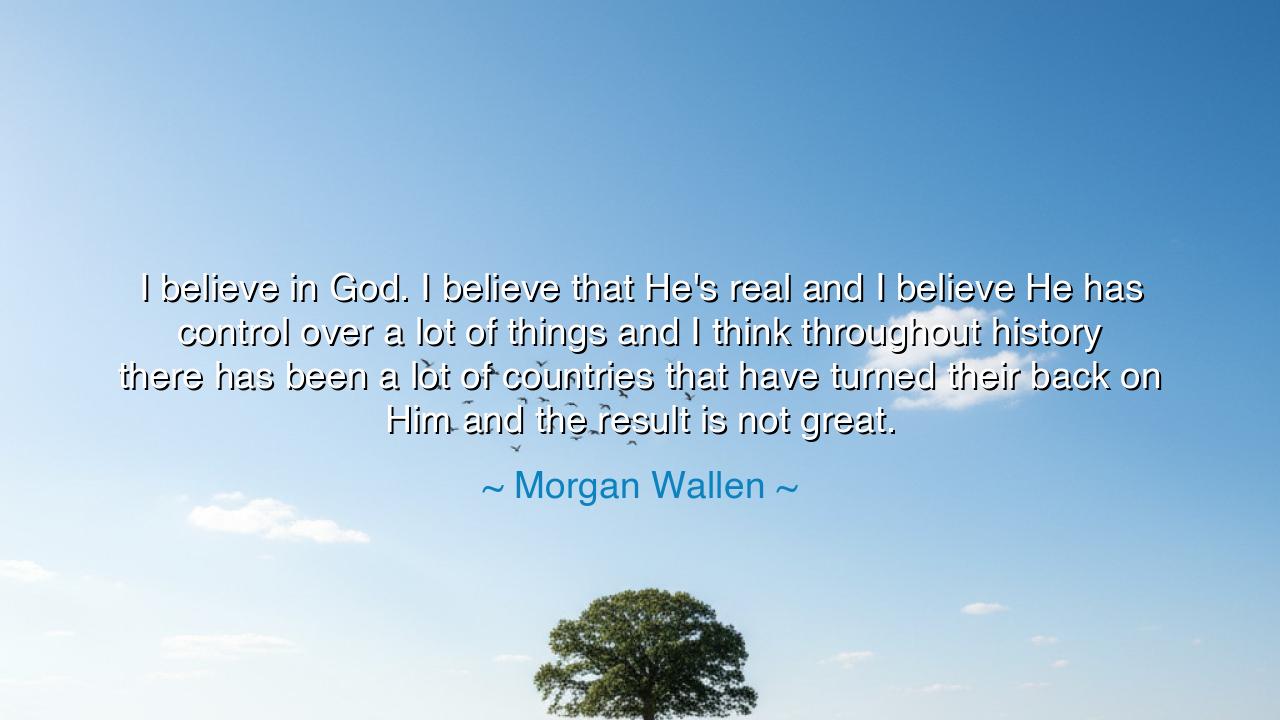
I believe in God. I believe that He's real and I believe He has
I believe in God. I believe that He's real and I believe He has control over a lot of things and I think throughout history there has been a lot of countries that have turned their back on Him and the result is not great.






When Morgan Wallen said, “I believe in God. I believe that He's real and I believe He has control over a lot of things and I think throughout history there has been a lot of countries that have turned their back on Him and the result is not great,” he was speaking not only from faith, but from the ancient awareness that the strength of nations rests not on power, but on reverence. His words carry a tone of humility, reminding us that beneath the rise and fall of civilizations flows a spiritual current — unseen, yet unbroken — the presence of the divine. In them echoes the same wisdom once spoken by prophets and kings: that when humanity exalts itself above heaven, it sows the seeds of its own undoing.
The origin of Wallen’s belief lies in the timeless soil of the human heart — the sense that there exists a greater order, a hand unseen that guides the world. Raised in the traditions of faith, he speaks as one who has witnessed both the fragility and the resilience of the human spirit. His reflection is not theological in argument, but experiential in tone. It comes from a place of awe — the recognition that God’s sovereignty is not a chain that binds, but a compass that guides. When he observes that societies which “turn their back on Him” meet ruin, he is echoing the patterns of history, seen again and again in the chronicles of empires.
Indeed, the ancients themselves recorded this truth. Consider Babylon, that shining city of grandeur and excess, whose towers rose to the heavens in defiance of humility. In their pride, its rulers forgot the source of their prosperity; they worshiped the works of their own hands. In the Book of Daniel, the mighty King Nebuchadnezzar stands as a warning — one who declared his glory and was brought low until he learned reverence. The fall of Babylon became not merely a political collapse, but a spiritual parable, a reminder that greatness without gratitude soon turns to dust. So it has been with Rome, with Egypt, and with many nations since: when they exalted power above purpose, they withered from within.
Wallen’s insight touches upon this universal rhythm — that faith is not weakness, but foundation. A nation, like a soul, must have a center. When it forgets that center, chaos enters. History shows that when societies begin to sever themselves from moral and spiritual truth, when they cast aside the sacred for the convenient, they lose their ability to discern right from wrong. Prosperity without virtue becomes poison. Freedom without conscience becomes tyranny. The result is not great, as Wallen puts it — not because of divine wrath alone, but because of the natural law written upon the heart of man: that no house can stand long if it has forgotten the cornerstone upon which it was built.
Yet his words are not condemnation, but invitation — a call to remembrance. To “believe in God” as he does is to choose humility over arrogance, gratitude over entitlement, reverence over rebellion. It is to recognize that there are forces greater than our ambition, and that to live rightly is to live in harmony with those forces. When Wallen speaks of God’s control, he speaks not of domination, but of divine order, the same order that holds the stars in their orbits and the seasons in their time. To align with it is to find peace; to turn from it is to drift into confusion. The wisdom of his words lies in their simplicity: belief is not an abstract creed, but a living posture of the soul.
We see this truth reflected in the story of King Solomon, who began his reign with devotion but lost his way in comfort. His kingdom, rich and powerful, was divided after his death — not by the strength of his enemies, but by the weakness of his own heart. “When Solomon grew old,” Scripture tells us, “his wives turned his heart after other gods.” His story stands as a mirror for all generations: that even wisdom and wealth cannot preserve a people that forgets its faith. For the decline of a nation often begins not in its fields or armies, but in the quiet fading of its reverence for the divine.
So, my child, take this teaching to heart: remember the source of your blessings. Whether you stand as one person or as part of a nation, do not let pride blind you to the hand that sustains you. Faith is not a relic of the past; it is the foundation of endurance. Walk humbly before the mystery of life; honor the sacred, and guard your heart against the illusion of self-sufficiency. For a world that forgets God forgets itself — its purpose, its beauty, its soul.
And let the lesson of Morgan Wallen’s words echo within you: belief is not a sign of weakness, but of wisdom. The wise know that no empire, no achievement, no human will can stand apart from the eternal. The nations that endure are those that remember gratitude; the lives that flourish are those that live with reverence. Hold fast, then, to faith — for in honoring what is higher than ourselves, we are lifted higher than we could ever climb alone.






AAdministratorAdministrator
Welcome, honored guests. Please leave a comment, we will respond soon